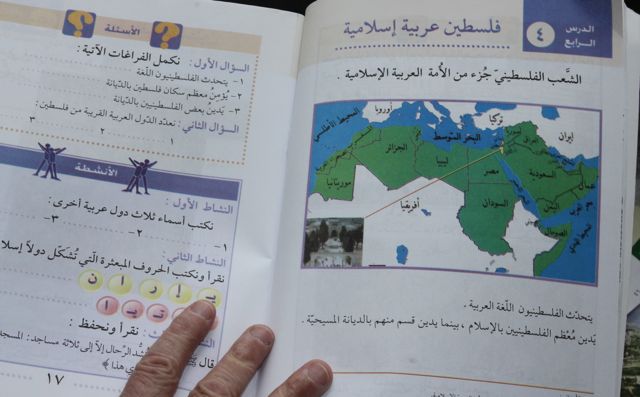Textbooks for Emirati students in grades 1-12 already include lessons about the peace treaty between Israel and the United Arab Emirates, media news outlets reported this week.
The textbooks praise the Abraham Accords, stating that “the historic agreement stems from the values of our true Islamic religion” and notes the importance of global peace initiatives.
“It is remarkable that a textbook that teaches about the UAE-Israel treaty was on the desks of schoolchildren in the Emirates just two weeks after the announcement of the agreement,” said Marcus Sheff, CEO of IMPACT-se, the Institute for Monitoring Peace and Cultural Tolerance in School Education, a research and policy institute that analyzes schoolbooks and curricula within the prism of UNESCO-defined standards on peace and tolerance.
“The treaty is not just presented as a fact in the textbook,” Sheff elaborated. “Students are presented with the religious, ethical and national reasons to support the agreement and employ critical thinking in completing an exercise about the importance of peace-making.”
An earlier IMPACT-se report on the UAE’s Moral Education curriculum, incorporated into the Emirati school system in 2016, was found to be groundbreaking in the region for its modern worldview and its emphasis on diversity, inclusivity and global peace.
Students are taught about the value of peace and that “at its foundation, the UAE placed central importance on the value of peaceful conflict resolution,” the report said. The curriculum also stresses the need to avoid violence at all costs.
“The fact that this Moral Education curriculum is independent of religious education makes it unique to the Arab world,” Sheff said.
“It is a highly visible result of Mohammed bin Zayed al-Nahyan’s stated aim to take back control of the education ministry from the Islamists who originally wrote the country’s textbooks. The material we have reviewed so far is a roadmap for young Emiratis towards moderation, respect for the ‘Other’, peace-making and tolerance.”
“At its heart, the ME course aims to teach children to participate in life in a responsible, productive and engaged manner. It is less about instructing students on how to behave and more about enabling them to determine the right course of action on their own. Eventually, the overall aim of this holistically-inspired course is to link all children in the UAE, regardless of nationality, to the common thread of humanity and share with them universal values and morals.”
An Emirati sixth-grade textbook states: “When you live in this world, it is inevitable to meet people from different cultures and different backgrounds. Our worldview is shaped by our environment. When we are little children, we assume that the whole world thinks and acts like us, and that culture is a permanent thing that cannot be changed. However, as we grow older, we begin to understand that culture is not something that stands still … Many believe that the key to world peace lies in respecting and accepting the contradictions between us.”
(YWN Israel Desk – Jerusalem)












4 Responses
Very heartwarming good news.
The pictured textbook definitely says nothing of the sort.
It says: Palestine is Arabic and Islamic. The Palestinian people are part of the Arab and Islamic Nation. The Palestinians Speak Arabic. Most Palestinians Believe in Islam, some of them profess Christianity…
I never learned how to convert Arabic letters into Hebrew. That would help confirm if these stories are true.
Moshiach is near!